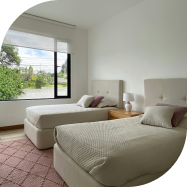03
03
Your guide to generating higher returns
HMO Property
Jump to section
Struggling to maximize rental income?
Many property investors face the challenge of increasing rental returns while managing risks. Traditional buy-to-let investments may not always yield the expected profits, and vacancy periods can significantly impact income.
The solution: HMO property investment
House in Multiple Occupation (HMO) properties offer a unique opportunity for investors to generate higher rental yields by renting out multiple rooms within a single property. This strategy not only boosts income but also minimizes vacancy risks compared to single-family rentals.
Understanding HMO properties

At Pinetree Capital, we specialize in helping property investors secure the right buy-to-let mortgage. Whether you're a first-time landlord or an experienced investor expanding your portfolio, we simplify the financing process and help you access market-leading rates. Our team, backed by years of banking and property finance expertise, ensures you get tailored solutions to maximize your returns.
Higher rental yields
Renting rooms individually often results in higher total rental income compared to renting the property as a whole.
Lower vacancy risk
Since multiple tenants occupy the property, losing one tenant does not result in a total loss of income.
Tax benefits
Many expenses, such as maintenance and marketing, can be deducted from taxable income.
Affordability for Investors
Higher rental income can improve affordability when securing a mortgage.
Portfolio diversification
HMOs allow investors to target various tenant demographics, including students and professionals.
What types of properties qualify as HMOs?
HMO properties can take various forms, including:

Houses or flats with individually let bedrooms

Student accommodations

Converted buildings with shared facilities

Buildings with non-compliant self-contained flats
Multi-Unit Freehold Blocks (MUFBs) vs. HMOs
While similar in investment potential, MUFBs consist of self-contained flats without shared facilities. Unlike HMOs, MUFBs do not usually require a license and involve less intensive property management.
Financing HMO and MUFB investments
Securing a mortgage for an HMO or MUFB requires specialist lenders. Some key factors lenders consider include:
- The number of letting rooms or self-contained units
- The need for an HMO license
- The type of tenancy agreements (joint or individual)
- The presence of multiple kitchens
HMO licensing and compliance
Investors must comply with local regulations, including obtaining an HMO license for properties with five or more tenants. Additional requirements may include:
- Fire safety measures
- Regular property inspections
- Compliance with planning permissions
Why choose us
Navigating the complexities of HMO and MUFB financing can be overwhelming. Our team of expert mortgage advisers at Pinetree Capital specializes in finding the right lender for your property investment. We offer:
Access to exclusive mortgage deals
Expert guidance on licensing and compliance
A seamless application process
Take the next step
Secure the right property finance with expert support, fast approvals, and tailored solutions.
Ready to secure the right property finance solution?
Get a personal consultation from a finance expert
Ready to secure the right property finance solution?
Ready to take the next step?
Contact us today to explore your options!



